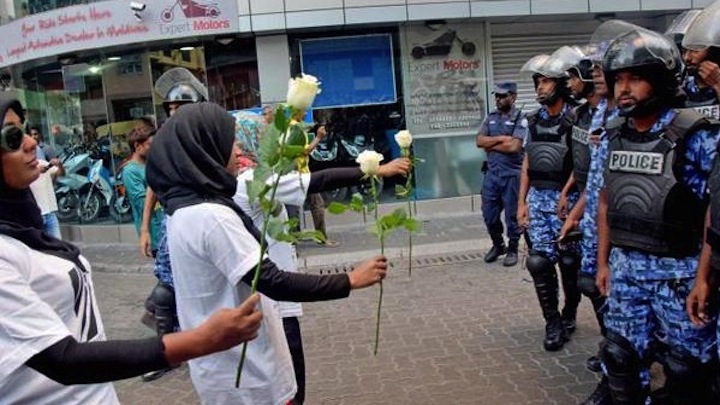Three activists were arrested from a youth-led opposition protest march yesterday after making a “peace offering” of white roses to riot police.
Specialist Operations (SO) police officers blocked the march at Orchid Magu, issued warnings of dispersal by force, and used pepper spray against protesters after the roses were laid at their feet, Mohamed Azmeel, president of the main opposition Maldivian Democratic Party’s (MDP) youth wing, told Minivan News today.
“White roses are used everywhere in the world as a peace offering. A group of youth offered white roses to police to show that we are peaceful. But they didn’t accept and pepper sprayed us,” he said.
He noted that the three activists taken into custody were among the group that offered roses to police.
The protest march dubbed ‘Heylaa’ (Wake Up) was organised by youth activists of the opposition alliance, made up of the MDP, the religious conservative Adhaalath Party, and the Jumhooree Party, with the aim of “bringing an end to brutality”.
The alliance has been staging nightly protests in Malé against what they call the government’s persecution of opposition political leaders. Former president Mohamed Nasheed and ex-defence minister Mohamed Nazim were sentenced last month to 13 years and 11 years in jail, respectively, on terrorism and weapon smuggling charges.
At least 140 protesters have been arrested since February. The MDP has previously accused SO officers of instigating a “coup d’etat” in February 2012 that led to then-president Nasheed’s resignation and of using excessive force against protesters.
The MDP youth wing has said protesters wore white t-shirts yesterday to “symbolise peace and friendship” while the white roses were offered to show that protesters were not seeking a violent confrontation.
Azmeel said he did not understand why police had to use pepper spray or make arrests as protesters did not attempt to break police lines.
He noted that police had not put up barricades on Orchid Magu.
A police media official said the three men were arrested for “disobeying orders” and “obstructing police duty.”
One protester was released “after giving advice” last night, he said, and police have not decided whether to seek extension of remand detention for the pair still under arrest.
Azmeel insisted that the march was peaceful and that protesters did not disobey orders.
“Disobeying orders would be crossing a barricade or refusing to take a route they showed. But none of that occurred there,” he said.
At least 150 youth led the march on Friday afternoon, Azmeel said, which began around 4:30pm at the Usfasgandu area and made its way west on the capital’s main thoroughfare, Majeedhee Magu.
The protest march stopped at various locations where youth leaders made speeches, he noted, adding that police had told protesters not to stop.
The march ended with a prayer for the safety of opposition leader Nasheed and other detainees.
Azmeel said the purpose of the march was “to raise concerns of youth and raise our voices.” The march was part of opposition activities in the run-up to a mass anti-government rally planned for May 1.
Last week, tourism minister Ahmed Adeeb challenged the opposition to a confrontation on May 1, prompting fears of a stand-off and civil unrest.
#Live #HappenningNow #ZuvaanungeHeylaaHingaalun #AnivaaverikanNinman @HamWahydd pic.twitter.com/kB0hJ6ntK2
— MDP Youth Wing (@MDPYouth) April 24, 2015
#Live #HappenningNow #ZuvaanungeHeylaaHingaalun #AnivaaverikanNinman pic.twitter.com/SHc6pyBSnL
— MDP Youth Wing (@MDPYouth) April 24, 2015
#Live #HappenningNow #ZuvaanungeHeylaaHingaalun #AnivaaverikanNinman pic.twitter.com/P1vwXAuxv4
— MDP Youth Wing (@MDPYouth) April 24, 2015


